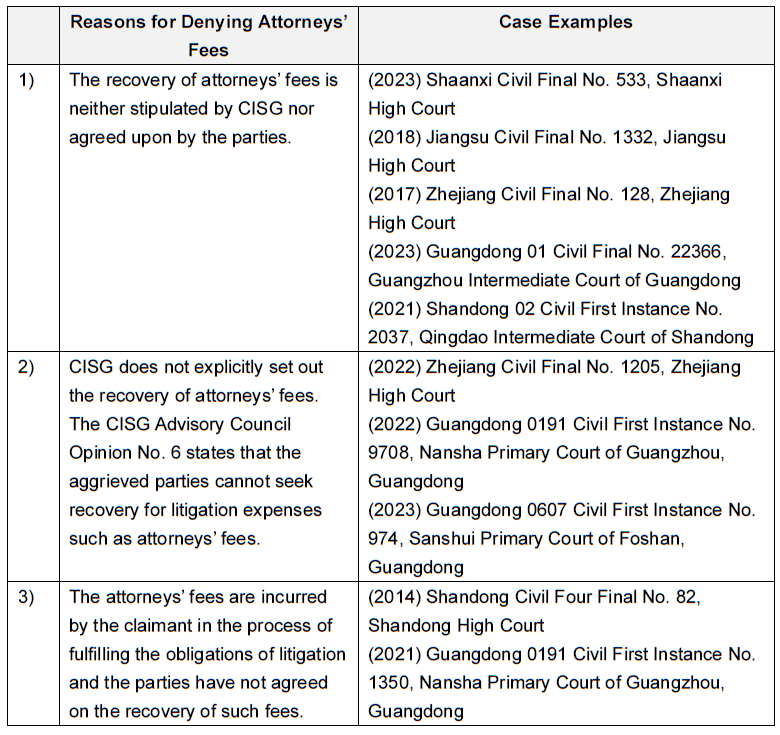It is commonly understood that attorneys’ fees are not recoverable losses under the laws of China (Hong Kong, Macao, and Taiwan excluded for the purpose of this article) in most types of legal disputes, with a handful of exceptions such as intellectual property and labor disputes. This rule is well-established in practice and applied in numerous cases heard by the Chinese courts, however, at the theoretical level, it is continuously debated among scholars and practitioners.
When it comes to the provision governing the calculation of damages in the United Nations Convention on Contracts for the International Sale of Goods (“CISG”), Article 74 of CISG is silent about whether litigation expenses, including attorneys’ fees, are recoverable in a dispute where CISG is applied. This has led to various interpretations by courts in different jurisdictions. By studying the case reports compiled by Chinese courts that reveal courts’ perspectives on attorneys’ fees under CISG, this article aims to reveal the prevailing opinions held by Chinese courts regarding this matter and to identify potential differences between relevant rules under CISG and Chinese laws, thereby providing predictability for future cases.
To avoid any doubt, the attorneys’ fees discussed herein solely refer to the costs incurred by a claimant within a specific court case and exclude any expenses arising from legal proceedings between the claimant and any third parties, such as its downstream buyers, local authorities, etc.
Interpretations of Article 74 of CISG
On the one hand, it is not surprising that advocates for classifying attorneys’ fees as recoverable losses primarily base their argument on the text of Article 74 of CISG and the principle of protecting bona fide parties. The rationale behind this argument is that attorneys’ fees are actual losses incurred by the parties, as evidenced by case reports from courts in Germany, Japan, and other jurisdictions.[1]
On the other hand, based on the principle of equality, the CISG Advisory Council takes a different stance in Opinion No. 6, maintaining that “although Article 74’s principle of full compensation appears to support the view that litigation expenses should be recoverable in order to make the aggrieved party whole, such an interpretation would be contrary to the principle of equality between buyers and sellers as expressed in Articles 45 and 61.” The underlying rationale is that “if legal expenses were awarded as damages under Article 74, an anomaly would result where only a successful claimant would be able to recover litigation expenses,” and therefore, this will give the prevailing claimants or respondents an unfair advantage.[2] However, the CISG Advisory Council is a private initiative, and as such, its opinions are not legally binding on the CISG contracting states.
Similar viewpoints are found in the case reports of some courts outside China. In some cases, certain courts rule that attorneys’ fees are not recoverable losses under Article 74, but a district court may exercise its inherent authority to penalize a litigant or the litigant’s lawyers for engaging in bad faith litigation practices.[3] In this sense, awarding attorneys’ fees as damages is an issue governed by domestic laws rather than CISG.
Case Study on Chinese Court Practices
Based on a study of accessible case reports, Chinese courts’ practices on whether an aggrieved party is entitled to recover attorneys’ fees as litigation costs under CISG vary. However, a clear pattern emerges: most Chinese courts dismiss such claims, suggesting a prevailing opinion against awarding attorneys’ fees as damages. This tendency has become more pronounced in recent years.
Reasons for Denial of Attorneys’ Fees
The grounds on which the courts deny the recovery of attorneys’ fees may vary, but can be broadly categorized as follows:

However, it is noteworthy that in some cases, courts may deny attorneys’ fees on one of the grounds listed above while granting awards of notarization and translation fees as litigation costs, showing certain inconsistencies in the underlying logics behind such awards.
Reasons for Awards of Attorneys’ Fees
Although less common and less recent, there are some case reports that support the recovery of attorneys’ fees under CISG. The rationale behind the case reports emphasizes the goal of protecting the rights of non-breaching parties, without touching upon the potential controversies surrounding the interpretation and scope of Article 74 of CISG.
The reasonings of awarding attorneys’ fees as reasonable litigation costs include:

By assessing the number of accessible case reports supporting each side, we can see that the Chinese courts tend to deny the recovery of attorneys’ fees and are typically inclined to adhere to previous case reports employing the same reasoning. However, we are under the impression that the courts’ tendency to dismiss the claims for recovery of attorneys’ fees is largely dictated by courts’ practices under Chinese laws, since these case reports seldom touch upon the interpretation of Article 74 of CISG and a significant portion of them reach their conclusions without providing a detailed rationale.
Trends of Future Chinese Court Practices
As indicated above, given the current court practices in China, the likelihood of claiming attorneys’ fees as recoverable losses under CISG before Chinese courts is relatively low. This trend is expected to persist in the near future.
A case report recently published in the Database of Cases of People’s Republic Courts (in Chinese: 人民法院案例库) states that the CISG Advisory Council Opinions could be taken as a reference when interpreting the articles of CISG,[4] further bolstering our stance on the trend. As the case reports in this Database are selected by the Supreme People’s Court of China, this development, to a certain extent, indicates the Supreme Court’s inclination towards considering such opinions. This recent case report provides Chinese courts a legal ground to interpret Article 74 of CISG along with the CISG Advisory Council Opinion No. 6, with the latter arguing against the recovery of attorneys’ fees. This case report, together with the CISG Advisory Council Opinion No. 6, may provide guidance for future practices of Chinese courts.
Despite the above-mentioned developments, it remains possible for claimants to argue for recovery of attorneys’ fees, given that the CISG Advisory Council Opinion No.6 is not binding and there have been no case reports directly addressing the issue. To recover attorneys’ fees, it is imperative to demonstrate the bad faith of the respondent, the significant losses incurred by the claimant due to the breach, the efforts made by the claimant for resolving the dispute, and the work performed by the attorneys.
Concluding Remarks
In contrast to the practices of some other jurisdictions, Chinese courts generally hold a negative attitude towards treating attorneys’ fees as recoverable losses. Although attorneys’ fees may not constitute a substantial portion of the claims in a dispute, they in some cases can be an important consideration for a claimant to decide whether to pursue legal action. Consequently, we find it of great importance to understand the stance of Chinese courts on this issue, which will greatly facilitate our efforts of protecting our clients’ interests.
[Note]
[1] See a summary on the website of CISG Online: https://cisg-online.org/cisg-article-by-article/part-3/art.-74-cisg/loss-by-category-of-loss/attorneys-fees.
[2] CISG-AC Opinion No 6, Calculation of Damages under CISG Article 74. Rapporteur: Professor John Y. Gotanda, Villanova University School of Law, Villanova, Pennsylvania, USA. Available at: https://cisgac.com/opinions/cisgac-opinion-no-6/.
[3] Zapata Hermanos Sucesores, S.A. v. Hearthside Baking Comp., U.S. Court of Appeals (7th Circuit), November 19, 2002, available at: https://cisg-online.org/search-for-cases?caseId=6625.
[4] A German Medical Technology Company v. a Ningbo Company over Contract of International Sales of Goods, Zhejiang High Court, Case No. (2022) Zhejiang Civil Final No. 1205, February 16, 2023. The reference number in the Database of Cases of People’s Republic Courts is 2024-10-2-084-001.
